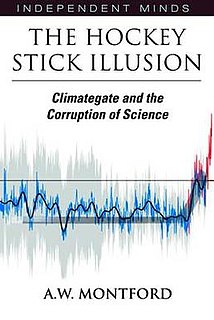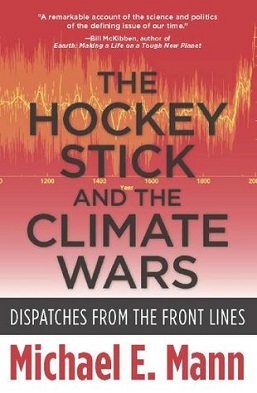
Patrick J. Michaels was an American agricultural climatologist. Michaels was a senior fellow in environmental studies at the Cato Institute until 2019. Until 2007, he was research professor of environmental sciences at the University of Virginia, where he had worked from 1980.

The temperature record of the last 2,000 years is reconstructed using data from climate proxy records in conjunction with the modern instrumental temperature record which only covers the last 170 years at a global scale. Large-scale reconstructions covering part or all of the 1st millennium and 2nd millennium have shown that recent temperatures are exceptional: the Intergovernmental Panel on Climate Change Fourth Assessment Report of 2007 concluded that "Average Northern Hemisphere temperatures during the second half of the 20th century were very likely higher than during any other 50-year period in the last 500 years and likely the highest in at least the past 1,300 years." The curve shown in graphs of these reconstructions is widely known as the hockey stick graph because of the sharp increase in temperatures during the last century. As of 2010 this broad pattern was supported by more than two dozen reconstructions, using various statistical methods and combinations of proxy records, with variations in how flat the pre-20th-century "shaft" appears. Sparseness of proxy records results in considerable uncertainty for earlier periods.

Michael Evan Mann is an American climatologist and geophysicist. He is the director of the Earth System Science Center at Pennsylvania State University. Mann has contributed to the scientific understanding of historic climate change based on the temperature record of the past thousand years. He has pioneered techniques to find patterns in past climate change and to isolate climate signals from noisy data.
Stephen McIntyre is a Canadian mining exploration company director, a former minerals prospector and semi-retired mining consultant whose work has included statistical analysis. He is best known as the founder and editor of Climate Audit, a blog devoted to the analysis and discussion of climate data. He is most prominent as a critic of the temperature record of the past 1000 years and the data quality of NASA's Goddard Institute for Space Studies. He is known in particular for his statistical critique, with economist Ross McKitrick, of the hockey stick graph which shows that the increase in late 20th century global temperatures is unprecedented in the past 1,000 years.

Gavin A. Schmidt is a climatologist, climate modeler and Director of the NASA Goddard Institute for Space Studies (GISS) in New York, and co-founder of the award-winning climate science blog RealClimate.

Richard A. Muller is an American physicist and emeritus professor of physics at the University of California, Berkeley. He was also a faculty senior scientist at the Lawrence Berkeley National Laboratory. In early 2010, Muller and his daughter Elizabeth Muller founded the group Berkeley Earth, an independent 501(c)(3) non-profit aimed at addressing some of the major concerns of the climate change skeptics, in particular the global surface temperature record. In 2016, Richard and Elizabeth Muller co-founded Deep Isolation, a private company seeking to dispose of nuclear waste in deep boreholes.
Climate Audit is a blog founded in 2005 by Steve McIntyre.

Hockey stick graphs present the global or hemispherical mean temperature record of the past 500 to 2000 years as shown by quantitative climate reconstructions based on climate proxy records. These reconstructions have consistently shown a slow long term cooling trend changing into relatively rapid warming in the 20th century, with the instrumental temperature record by 2000 exceeding earlier temperatures.

James Mark Court Delingpole is an English writer, journalist, and columnist who has written for a number of publications, including the Daily Mail, Daily Express, The Times, The Daily Telegraph, and The Spectator. He is a former executive editor for Breitbart London, and has published several novels and four political books. He describes himself as a libertarian conservative. He has frequently published articles promoting climate change denial. and expressing opposition to wind power.
The Science and Public Policy Institute (SPPI) is a United States public policy organization which promotes climate change denial.
The Climatic Research Unit email controversy began in November 2009 with the hacking of a server at the Climatic Research Unit (CRU) at the University of East Anglia (UEA) by an external attacker, copying thousands of emails and computer files to various internet locations several weeks before the Copenhagen Summit on climate change.

Climatic Research Unit documents including thousands of e-mails and other computer files were stolen from a server at the Climatic Research Unit of the University of East Anglia in a hacking incident in November 2009. The documents were redistributed first through several blogs of global warming deniers, who alleged that the documents indicated misconduct by leading climate scientists. A series of investigations rejected these allegations, while concluding that CRU scientists should have been more open with distributing data and methods on request. Precisely six committees investigated the allegations and published reports, finding no evidence of fraud or scientific misconduct. The scientific consensus that global warming is occurring as a result of human activity remained unchanged by the end of the investigations.
Watts Up With That? (WUWT) is a blog promoting climate change denial that was created by Anthony Watts in 2006.
Andrew William Montford is a British writer and editor who is the owner of the Bishop Hill blog. He is the author of The Hockey Stick Illusion (2010).

The Hockey Stick Illusion: Climategate and the Corruption of Science is a book written by Andrew Montford and published by Stacey International in 2010, which promotes climate change denial.
The Attorney General of Virginia's climate science investigation was a civil investigative demand initiated in April 2010 by Virginia Attorney General Ken Cuccinelli, who rejects the scientific consensus on climate change, for a wide range of records held by the University of Virginia related to five grant applications for research work by a leading climate scientist Michael E. Mann, who was an assistant professor at the university from 1999 to 2005. The demand was issued under the Virginia Fraud Against Taxpayers Act in connection with claims by Cuccinnelli that Mann had possibly violated state fraud laws in relation to five research grants, by allegedly manipulating data. No evidence of wrongdoing was presented to support the claim. Mann's earlier work had been targeted by climate change deniers attacking the hockey stick graph, and allegations against him were renewed in late 2009 in the Climatic Research Unit email controversy but found to be groundless in a series of investigations.
A pseudoproxy is a synthetic dataset used in paleoclimatology to test methods of reconstruction of global or hemispherical climate change from temperature records, developed for reconstructing the temperature record of the past 1000 years using proxies for periods before the instrumental temperature record. In May 2002 Michael E. Mann and Scott Rutherford published a paper introducing this method of adding artificial noise to actual temperature records or to climate model simulations to produce what they called "pseudoproxies". When the reconstruction algorithms were used with these pseudoproxies, the result was then compared with the original record or simulation to see how closely it had been reconstructed. They discussed the issue that regression methods of reconstruction tended to underestimate the amplitude of variation.
The Wegman Report was prepared in 2006 by three statisticians led by Edward Wegman at the request of Rep. Joe Barton of the United States House Committee on Energy and Commerce to validate criticisms made by Stephen McIntyre and Ross McKitrick of reconstructions of the temperature record of the past 1000 years, in particular the reconstructions by Mann, Bradley and Hughes of what had been dubbed the hockey stick graph.
The North Report was a 2006 report evaluating reconstructions of the temperature record of the past two millennia, providing an overview of the state of the science and the implications for understanding of global warming. It was produced by a National Research Council committee, chaired by Gerald North, at the request of Representative Sherwood Boehlert as chairman of the U.S. House of Representatives Committee on Science.

The New Climate War: The Fight to Take Back Our Planet is a 2021 book on climate change by the American climatologist and geophysicist Michael E. Mann. In the book, Mann discusses the actions of the fossil fuel industry to delay action on climate change, the responses to climate change that he considers inadequate, and the responses he considers the best. The book received positive reviews. Mann argued in an interview with Rolling Stone's Jeff Goodell that a "clean energy revolution and climate stabilization are achievable with current technology. All we require are policies to incentivize the needed shift."










